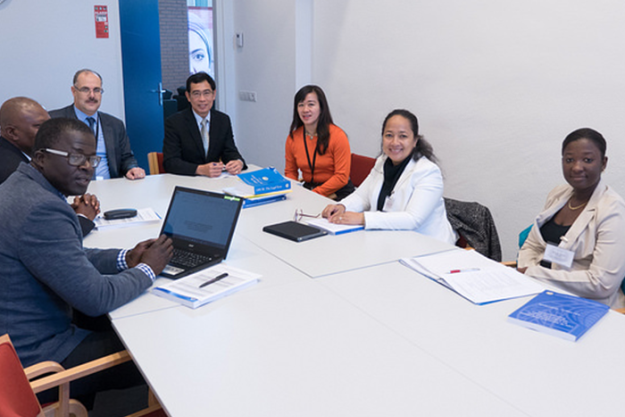
Participants at the 18th edition of Internship Programme for Legal Drafters and National Authority Representatives held in The Hague
THE HAGUE, Netherlands — 21 November 2017 — Representatives from Sierra Leone and Suriname acquired new skills on drafting national legislation for the implementation of the Chemical Weapons Convention (CWC), during the 18th edition of Internship Programme for Legal Drafters and National Authority Representatives held in The Hague, from 6 – 10 November.
The Internship Programme conducted by members of OPCW’s Technical Secretariat, enabled four participants to formulate a plan for the implementation of the CWC in their home countries and gain a better understanding of the work of the Organisation for the Prohibition of Chemical Weapons (OPCW).
A National Authority representative from Sierra Leone, Mr Patrick Koroma, expressed appreciation for the Programme, stressing that “it was very well-structured and we gained a lot of knowledge about the CWC which we can bring back to our capitals and share with various national stakeholders”.
The programme covered a wide range of topics, including an overview of the legal requirements under the CWC and the work of the OPCW, legal issues in national implementation, initial and annual declarations to the OPCW, the role of the National Authority, and provisions in national implementing legislation to address chemical terrorism as well as legislative support available for the States Parties.
After the presentations about the CWC and drafting sessions, participants from each country submitted a comprehensive National Action Plan and a summary of its draft legislation. The plan comprised a timeline for the adoption of the CWC which would serve as reference for the Technical Secretariat.
Background
Since its launch in 2012, the Internship Programme has benefited 37 States Parties. Among these, Cape Verde, Grenada, Panama, Paraguay and Uganda have successfully enacted national legislation, while others are at various stages of the adoption process.
As the implementing body for the Chemical Weapons Convention, the OPCW oversees the global endeavour to permanently and verifiably eliminate chemical weapons. Since the Convention’s entry into force in 1997 – and with its 192 States Parties – it is the most successful disarmament treaty eliminating an entire class of weapons of mass destruction.
Over ninety-six per cent of all chemical weapon stockpiles declared by possessor States have been destroyed under OPCW verification. For its extensive efforts in eliminating chemical weapons, the OPCW received the 2013 Nobel Prize for Peace.
